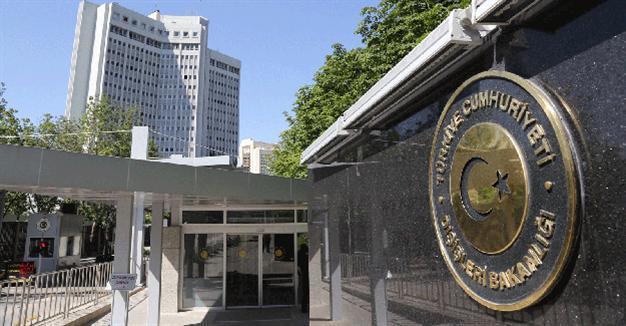Turkish Foreign Ministry calls French genocide denial bill a risk to freedom of expression
ANKARA
 The Turkish Foreign Ministry has cautioned that a French bill criminalizing the denial of “genocide,” unanimously passed by the lower house of the French parliament on July 1, had the potential to unlawfully limit freedom of expression, while a former diplomat has claimed the bill was related to the “personal interests” of French politicians.
The Turkish Foreign Ministry has cautioned that a French bill criminalizing the denial of “genocide,” unanimously passed by the lower house of the French parliament on July 1, had the potential to unlawfully limit freedom of expression, while a former diplomat has claimed the bill was related to the “personal interests” of French politicians.“We have closely followed the preparation and adoption processes of the draft amendments to the Law on the Freedom of Press that the French National Assembly adopted concerning criminalization of the denial of war crimes, crimes against humanity and the crime of genocide under certain conditions,” said Foreign Ministry Spokesperson Tanju Bilgiç in a written statement released late on July 6.
“In the event that the draft is enacted in its present form, it has the potential to pose the risk of unlawfully limiting the freedom of expression, especially impinging on the jurisprudences of the ECtHR [the European Court of Human Rights] and the Constitutional Council of France,” said Bilgiç in the statement, which came in the form of an official answer by the spokesperson to a journalist’s question.
“We will also closely follow the upcoming process at the French senate in the near future regarding the draft, which has not yet been enacted,” said the statement.
“We expect that the French senate will remove the elements that may have the potential to pose the risk of limiting the freedom of expression from the draft,” concluded the statement.
The French bill set out penalties of up to a year in prison and a 45,000-euro ($50,000) fine for those who publicly deny “genocide,” reported Agence France-Presse.
The two houses of the French parliament passed a similar law in December 2011 and January 2012, though the country’s constitutional court later struck down that law, ruling that it is an infringement on freedom of speech. In July 2012, French President Francois Hollande confirmed plans for a new law with representatives of the Armenian community.
‘An issue completely relating to the personal interests of French politicians’
In an interview with the Azerbaijan Press Agency (APA), Osman Korutürk, a former ambassador of Turkey to Paris, remarked that France’s adoption of a bill criminalizing genocide denial was “not due to love for Armenians.”
“This is an issue completely relating to personal interest of French politicians, not for their love to Armenians. There are Armenians in France’s different regions who own great wealth,” said Korutürk, a former Istanbul deputy for the main opposition Republican People’s Party (CHP), in the interview posted on July 6.
“They can influence the policy. One of senior advisors of Hollande in the election was Armenian. Hollande had promised Armenians that this bill will be adopted. After the parliament adopted the bill with the initiative of a politician like [former French President Nicolas] Sarkozy, who did not obey rules of law, the Constitutional Council of France had rejected the bill because it was against freedom of speech and expression, human rights. We were happy at that time that the Constitutional Council of France foregrounded the human rights [because] France is the cradle of the freedom. Now, the bill with the same content was adopted by the parliament with the initiative of Hollande. Compared to [the] previous bill, a small amendment was made in it: to criminalize ‘genocide’ denial, the ‘genocide’ does not need to be confirmed by any independent court,” said the retired veteran diplomat.
“Therefore, despite [the fact that] no independent court [has] passed [a] ‘genocide’ decision about [the] 1915 events, they planned to include it in the list of other formal genocides,” said Korutürk, referring to the Ottoman-era mass killings of Anatolian Armenians.
“This time, the Constitutional Council of France may not reject the bill. [The] Turkish government has sent the representatives of [the] other three parties in the [Turkish] parliament, who are engaged in this issue, to relevant countries to struggle politically, diplomatically and legally… [against] such issues,” he also said.
















